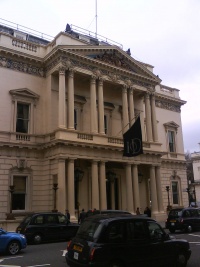Difference between revisions of "Institute of Directors"
(old page needs substantial update) |
|||
| Line 2: | Line 2: | ||
'''The Institute of Directors''' was established in 1903 and granted a Royal Charter in 1906. It is an association of businessmen rather than of businesses. With over 37,000 members, the lowest common denominator effect ensures that it's far less dangerous than the [[European Round Table of Industrialists]] (ERT), for example, though it does tend to be rather more right wing and 'nationalist'. | '''The Institute of Directors''' was established in 1903 and granted a Royal Charter in 1906. It is an association of businessmen rather than of businesses. With over 37,000 members, the lowest common denominator effect ensures that it's far less dangerous than the [[European Round Table of Industrialists]] (ERT), for example, though it does tend to be rather more right wing and 'nationalist'. | ||
| − | As a result its views differ from those of the [[Confederation of British Industry]] ([[CBI]]) (for example), as the IoD is an association of people each with an equal say - the majority come from small businesses (whereas the [[CBI]] is an association of businesses, some of which are larger and more influential). While the [[ERT]] is pro-single currency and the CBI is split, the IoD is opposed to it. IoD's biggest recent success has been the 1995 Budget cuts to both capital gains and inheritance tax.<ref>ref | + | As a result its views differ from those of the [[Confederation of British Industry]] ([[CBI]]) (for example), as the IoD is an association of people each with an equal say - the majority come from small businesses (whereas the [[CBI]] is an association of businesses, some of which are larger and more influential). While the [[ERT]] is pro-single currency and the CBI is split, the IoD is opposed to it. IoD's biggest recent success has been the 1995 Budget cuts to both capital gains and inheritance tax.<ref> IoD Website [http://www.iod.com/is-bin/INTERSHOP.enfinity/eCS/Store/en/-/GBP/IODContentManager-Start?TemplateName=homePage.isml Home Page] Last Accessed 12th June 2007</ref> |
| + | ==Publications== | ||
| + | *IOD produces a monthly magazine, ''The Director''. | ||
| + | *Corin Taylor, 'Getting shale gas working', IOD, May 2013 <ref> [http://www.petroleum-economist.com/Article/3208969/UK-shale-gas-lobbying-heats-up.html UK shale gas lobbying heats up], Petroleum Economist, 22 May 2013 </ref> | ||
| − | + | ==People== | |
| + | *[[Neville Bain]] a non-executive director with [[S&N]], chairman. | ||
| + | *[[Corin Taylor]], senior economic adviser at the IOD | ||
| − | + | ==Contact== | |
| − | |||
| − | == | ||
[[116 Pall Mall]], London SW1Y 5ED tel. 0207 839 1233 | [[116 Pall Mall]], London SW1Y 5ED tel. 0207 839 1233 | ||
| − | |||
== Notes == | == Notes == | ||
Revision as of 04:14, 12 February 2014
The Institute of Directors was established in 1903 and granted a Royal Charter in 1906. It is an association of businessmen rather than of businesses. With over 37,000 members, the lowest common denominator effect ensures that it's far less dangerous than the European Round Table of Industrialists (ERT), for example, though it does tend to be rather more right wing and 'nationalist'.
As a result its views differ from those of the Confederation of British Industry (CBI) (for example), as the IoD is an association of people each with an equal say - the majority come from small businesses (whereas the CBI is an association of businesses, some of which are larger and more influential). While the ERT is pro-single currency and the CBI is split, the IoD is opposed to it. IoD's biggest recent success has been the 1995 Budget cuts to both capital gains and inheritance tax.[1]
Publications
- IOD produces a monthly magazine, The Director.
- Corin Taylor, 'Getting shale gas working', IOD, May 2013 [2]
People
- Neville Bain a non-executive director with S&N, chairman.
- Corin Taylor, senior economic adviser at the IOD
Contact
116 Pall Mall, London SW1Y 5ED tel. 0207 839 1233
Notes
- ↑ IoD Website Home Page Last Accessed 12th June 2007
- ↑ UK shale gas lobbying heats up, Petroleum Economist, 22 May 2013
